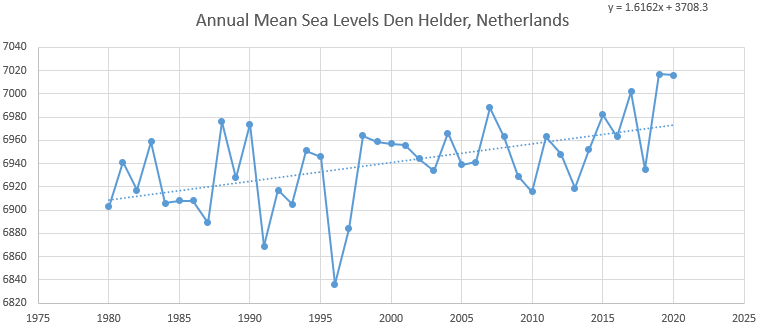The Dutch know a great deal about living with rising seas. Since they managed long ago to carve out an existence below sea level by building dykes and canal drainage systems, they don’t look at the possibility of being inundated by sea level rise as an abstract threat. Then again, since they do a careful job of measuring actual sea level instead of just running computer simulations, they might not look at it as a threat at all. For instance, here is the sea level record from Den Helder, north of Amsterdam.

At the current rate of rise (1.6 mm per year) it will take 617 years to go up one meter. And if that surge outpaces the ability of the Dutch to adapt, we have to wonder how they ever got their country built in the first place.
As always in this series our data come from the Liverpool-based Permanent Service for Mean Sea Level. And we caution that it is not always easy to find places with continuous long term records. And we should note one of the challenges of interpreting sea level data is that many things other than the simple expansion of the seas due to warming can cause an apparent rise. As the PSMSL explains, earthquakes, ground water extraction, sedimentation and even delayed effects from the last ice age can cause the land adjacent to the ocean to move up or down. The one thing we don’t expect to see is a sea surface level that never varies.



One likely contributor to the miniscule amount of sea level rise measured over the past century has got to be - natural erosion and sedimentation. Have never seen anyone mention this, but when one considers the billions of tons of dirt, rock, sand and sediments dumped naturally into oceans (year around, 24/7, everywhere around the world) from eroding mountains and rainfall continually washing away topsoil - this has got to have some effect (amount unknown) in "the filling of the oceans". How can it not?
We know that even the most magnificent mountain ranges have a very short geological lifespan due to the effects of freezing, gravity, wind and flowing water constantly working to level them out. And we know that much of this is washed away downstream - - - into oceans.
I did find this link to this article : "Sedimentation and Sea Level" in Integrate
https://serc.carleton.edu/integrate/teaching_materials/coastlines/student_materials/886
But just like none of the dozens of factors which impact earth's global temperature (other than C)2) are ever mentioned - this erosion of land flushing into oceans (also never mentioned) has got to be have an impact.